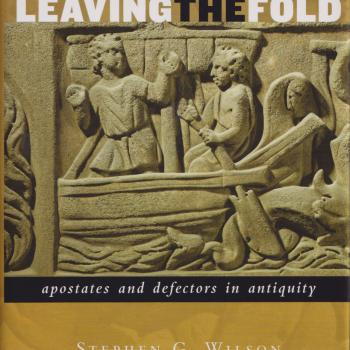
Canadian evangelist Charles Templeton professed salvation in 1936, when he was 21. So energized was he by his new-found faith, that he quickly became a touring evangelist, a pastor, and a vice-presidents of the newly-formed Youth For Christ International organization.
Templeton’s dynamic energy, commitment and persuasiveness were almost immediately recognizable, and in 1946, he was listed among those best used of God by the National Association of Evangelicals. He was even considered to be a greater evangelist than his contemporary, Billy Graham –packing stadiums with up to 91,000 young servicemen and civilians, eager to adopt the message of the Gospel; as well as to hear the music and various acts.
Nine years after he began his evangelism, he and Graham met one another face-to-face.
Hardly feeling any rivalry, the two formed a quick friendship; and thereafter, a partnership. They began to evangelize as a team, and even bunked up together.
The two did the most work together in their combined tour of Europe. But after four years of touring together, Templeton found his faith was on the rocks, as he developed serious doubts with which he was struggling.
After coming to grips with his doubts, Templeton resolved to attend Princeton Theological seminary to shore up his faith, and to find answers to his questions. Templeton tried to talk Graham into going with him. Templeton recounts the conversation in his 1996 book Farewell to God. This is Templeton’s recollection as portrayed in his book:
“All our differences came to a head in a discussion which, better than anything I know, explains Billy Graham and his phenomenal success as an evangelist.
In the course of our conversation I said, ‘But, Billy, it’s simply not possible any longer to believe, for instance, the biblical account of creation. The world was not created over a period of days a few thousand years ago; it has evolved over millions of years. It’s not a matter of speculation; it’s a demonstrable fact.’
‘I don’t accept that’ Billy said. ‘And there are reputable scholars who don’t.’
‘Who are these scholars?’ I said. ‘Men in conservative Christian colleges[?]’
‘Most of them, yes,’ he said. ‘But that is not the point. I believe the Genesis account of creation because it’s in the Bible. I’ve discovered something in my ministry: When I take the Bible literally, when I proclaim it as the word of God, my preaching has power. When I stand on the platform and say, ‘God says,’ or ‘The Bible says,’ the Holy Spirit uses me. There are results. Wiser men than you or I have been arguing questions like this for centuries. I don’t have the time or the intellect to examine all sides of the theological dispute, so I’ve decided once for all to stop questioning and accept the Bible as God’s word.’
‘But Billy,’ I protested, ‘You cannot do that. You don’t dare stop thinking about the most important question in life. Do it and you begin to die. It’s intellectual suicide.’”
‘I don’t know about anybody else,’ he said, ‘but I’ve decided that that’s the path for me.’”
(Templeton, 1996, pp. 7-8)
Seminary did not answer Templeton’s questions however. If anything, it brought about further doubts and concerns. Post-seminary, Templeton tried to step back into ministry and accepted a position with the National Council of Churches, while continuing to tour and preach.
However, Templeton’s health was not good, and he began to experience frequent chest pains.
Physicians ascertained that Templeton was experiencing stress, and suggested that he clear up any conflict he was feeling or dealing with.
Templeton resigned his current evangelical positions and activities, and took on the less stressful role as the head of the Department of Evangelism of the Presbyterian Church USA, and the host of a television show titled “Look up and Live.”
Templeton’s struggle with doubts never ceased, however, and he began to feel himself a hypocrite. So in 1957, at the age of 42, Templeton dropped all of his ministry activity, and publicly announced that he was no longer a believer.
While Templeton expressed many of his objections to Christianity in his 1996 book Farewell to God, most of them had to do with the conflict between science and religion focused on things like the age of the earth, evolution, the Flood account, psychology and sin.
In his book, Templeton says:
‘I oppose the Christian Church because, for all the good it sometimes does, it presumes to speak in the name of God and to propound and advocate beliefs that are outdated, demonstrably untrue, and often, in their various manifestations, deleterious to individuals and to society.’
Journalist and Christian author Lee Strobel visited and spoke with Templeton in his latter years when the man was nearing death. During that conversation, Templeton outlined his objections to Christianity and to God.
On his deathbed, Templeton’s various objections included outrage against various atrocities in the Bible for which God is said to be responsible, and scriptural passages which he found intellectually obtuse.
Despite his persistent unbelief up until his death at the age of 86, Templeton clung to an admiration of the character of Jesus. In his interview with Strobel, Templeton lavished praise upon the Christ, speaking of his unparalleled purity, his unique moral teaching, and his toughness in the face of adversaries and struggles.
Templeton ended his monologue in tears, saying, “I adore him,” and, “I miss him.”


















